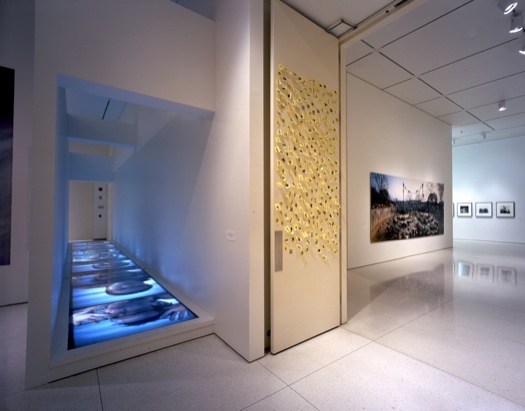Past Exhibitions : 2004
Illuminations: Sculpting with Light
January 22 – April 4, 2004
This exhibition examined three distinct moments in which American artists devised innovative ways to use this elemental, immaterial medium; including works by Charles Biederman, Dan Flavin, Robert Irwin, James Turrell and a major commission by Stephen Hendee.
The Uses of Art in Renaissance Italy
March 9 – August 22, 2004
Drawing principally on the Smart Museum's permanent collection, The Uses of Art in Renaissance Italy considered the daily life of strikingly diverse objects: a silver reliquary, a marble tabernacle, an embroidered chasuble, a birth bowl—as well as altarpieces, works on paper and a selection of important medals.
Incisive Vision: The Prints of James Abbott McNeill Whistler
April 2 – June 13, 2004
Active in England and France, the American-born painter James Abbott McNeill Whistler (1834–1903) is one of the giants of nineteenth-century printmaking. This exhibition featured a selection of the 25 prints by Whistler donated to the Smart Museum in 2001. Included are early, middle, and late period etchings and drypoints.
Taisho Chic: Japanese Modernity, Nostalgia, and Deco
April 22 – June 20, 2004
As western "Jazz Age" mores and styles jostled with traditional Japanese values of tranquility and harmony, the reign of Emperor Taisho (1912–1926) was an era of transition in Japan when the vastly different cultures of the native past and the seemingly foreign future emerged in stark contrast.

Smart Collecting: A Thirtieth Anniversary Celebration
July 8 – September 5, 2004
For thirty years the Smart Museum has been a focal point for the visual arts at the University of Chicago and in the city.

Medieval Art and Medievalisms
September 7, 2004 – January 2, 2005
From the Early Christian material culture of Egypt and the Eastern Roman empire and the devotional art of Gothic Europe to the Celtic revival of the nineteenth century, medieval art shifted from iconic religious image to historical tribute.

Between Past and Future: New Photography and Video from China
October 2, 2004 – January 16, 2005
This exhibition was the first to comprehensively consider the outpouring of photo-based art that has taken place in China since the mid-1990s. Ambitious in scale and experimental in nature, the photographic works included in this groundbreaking project offered a range of highly individual responses to the unprecedented changes in China's economic, social, and cultural life in the past decade.